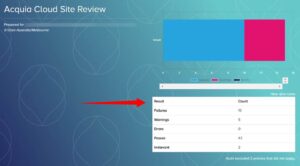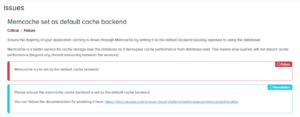In the dynamic world of digital experiences, maintaining a high-performing and secure website is paramount. For organizations leveraging the power of Acquia Cloud, proactive site reviews are essential for optimizing performance, identifying potential risks, and ensuring a smooth and successful digital journey. This blog post will delve into the significance of Acquia Cloud Site Reviews, outlining their purpose, key components, and the invaluable insights they provide.
Why Conduct Acquia Cloud Site Reviews?
Acquia Cloud Site Reviews offer a comprehensive evaluation of your website’s health and performance within the Acquia ecosystem. These reviews provide valuable insights that can:
- Enhance Performance: Identify and address performance bottlenecks, such as slow page load times, high resource consumption, and inefficient caching mechanisms. This leads to improved user experience, higher conversion rates, and enhanced search engine rankings.
- Strengthen Security: Proactively uncover and mitigate security vulnerabilities, including outdated software, misconfigurations, and potential attack vectors. Regular reviews help ensure your website remains protected from malicious threats.
- Optimize Costs: Identify areas for cost optimization within your Acquia Cloud environment. This may include right-sizing your infrastructure, optimizing resource utilization, and identifying unused services.
- Improve Stability: Pinpoint potential instability issues, such as code errors, database inconsistencies, and environmental factors that could lead to unexpected downtime.
- Ensure Compliance: Verify compliance with industry standards and best practices, such as security regulations and accessibility guidelines.
When to Conduct Acquia Cloud Site Reviews
Regular Acquia Cloud Site Reviews are recommended at various stages of your website’s lifecycle:
- Post-Launch: Conduct a thorough review shortly after launching a new website or significant updates to identify any unforeseen issues and ensure smooth operation.
- Before Major Releases: Prior to major website releases or marketing campaigns, perform a comprehensive review to anticipate potential performance bottlenecks and ensure a seamless user experience.
- Annually or Biannually: Schedule regular reviews at least annually or biannually to proactively identify and address emerging issues, optimize performance, and ensure ongoing stability.
- After Significant Changes: Conduct reviews after significant changes to your website’s infrastructure, codebase, or content to assess the impact and ensure continued optimal performance.
- When Facing Performance Issues: If you experience performance degradation, unexpected downtime, or security incidents, a thorough review can help pinpoint the root cause and implement corrective measures.

Key Components of an Acquia Cloud Site Review
A comprehensive Acquia Cloud Site Review typically includes the following key components:
SLA Impact Assessment:
- Evaluate potential impacts on Service Level Agreements (SLAs) based on identified issues.
- Analyze historical performance data to identify potential future risks.
- Recommend proactive measures to ensure continued SLA adherence.
Application Information:
- Gather detailed information about your website’s architecture, including:
-
- Name (Application Name)
-
- Hosting environment (e.g., Acquia Cloud Platform, Acquia Cloud Edge)
-
- Subscription
-
- Organization
-
- Drupal Version
-
- Drush Version
-
- Deployed Code
Issue Summary:
- Provide a concise overview of the most critical issues identified during the review.
- Prioritize issues based on severity and potential impact.
- Clearly communicate the urgency and importance of addressing each issue.

Issues:
- Detailed descriptions of all identified issues, categorized by severity (e.g., critical, major, minor).
- Include specific recommendations for remediation and potential workarounds.
- Provide supporting evidence, such as performance data, code snippets, and security scans.

Warnings:
- Identify potential future problems or areas of concern.
- Provide proactive recommendations to mitigate risks and prevent future issues.
- Highlight potential areas for improvement in website performance, security, and scalability.

Audit Synopsis:
- Summarize the key findings and recommendations of the review.
- Provide an overall assessment of your website’s health and performance within the Acquia ecosystem.
- Outline a roadmap for addressing identified issues and improving website performance.

Benefits of Acquia Cloud Site Reviews
- Improved Website Performance: Enhance website speed, reduce page load times, and improve user experience.
- Enhanced Security: Identify and mitigate security vulnerabilities, protecting your website from attacks.
- Reduced Downtime: Minimize unexpected downtime and ensure business continuity.
- Optimized Costs: Identify opportunities to optimize resource utilization and reduce hosting costs.
- Increased Agility: Proactively address issues and adapt to changing business needs.
- Data-Driven Decision Making: Gain valuable insights into website performance and make informed decisions.
Conclusion
Acquia Cloud Site Reviews are an invaluable tool for organizations seeking to maximize the value of their Acquia Cloud investment. By proactively identifying and addressing potential issues, you can ensure optimal website performance, enhance security, and deliver exceptional user experiences. I hope this comprehensive blog post provides a valuable overview of Acquia Cloud Site Reviews.

